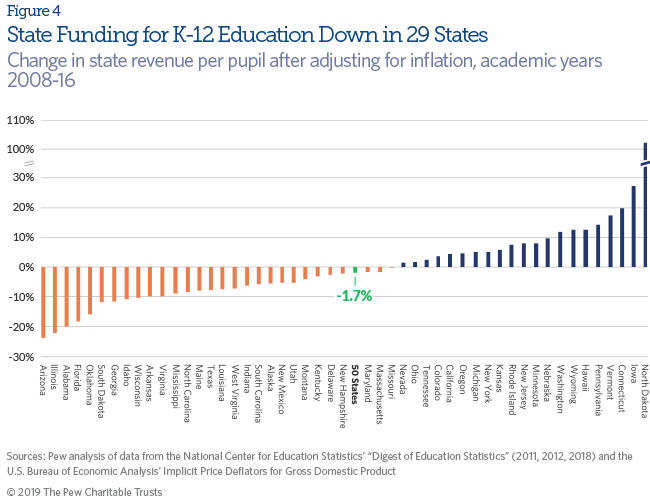Idaho’s education spending hasn’t fully recovered from the budget cuts of the Great Recession, according to a new national study released Tuesday.
Idaho’s spending per pupil, and spending per full-time college student, has decreased since 2008. What’s more, Idaho’s losses were more severe than national averages.
Idaho’s predicament is not unique, the Philadelphia-based Pew Charitable Trusts said in a report decrying a “lost decade” for a host of state government programs.
“Even though total state tax revenue recovered nearly six years ago from its losses in the downturn, many states are still dealing with fallout from the tough choices they had to make to fill budget holes during the recession, including recent strikes by teachers who went years without pay raises, higher tuition at public universities, complaints from local governments living with less state aid, mounting repair bills for public infrastructure, and smaller state workforces,” according to the report.
During the recession, Idaho cut year-to-year K-12 spending for the first time in state history. Spending has rebounded since then. Over each of the past five years, Idaho has increased K-12 spending by at least $100 million.
Still, Idaho fares poorly in the Pew rankings. Here are some Idaho and national comparisons (all numbers are adjusted for inflation):
- Overall, Idaho state spending increased by 6 percent from Fiscal Year 2008 to FY 2018. The national average is a 4 percent increase — and nearly half of the states have experienced decreases over the decade.
- However, Idaho’s per-pupil spending decreased by 11 percent from 2008 to 2016 — and only seven states experienced a steeper decrease. Nationally, per-pupil spending increased by nearly 2 percent.
- In higher education, Idaho’s spending dropped by 18 percent per full-time equivalent student. Nationwide, the decrease was 13 percent.
The Pew “lost decade” study casts a new light on Idaho’s per-pupil spending, which continues to lag nationally. Idaho’s spending continues to rank No. 50 in the nation, ahead of only Utah, according to 2017 numbers compiled by the U.S. Census Bureau.

